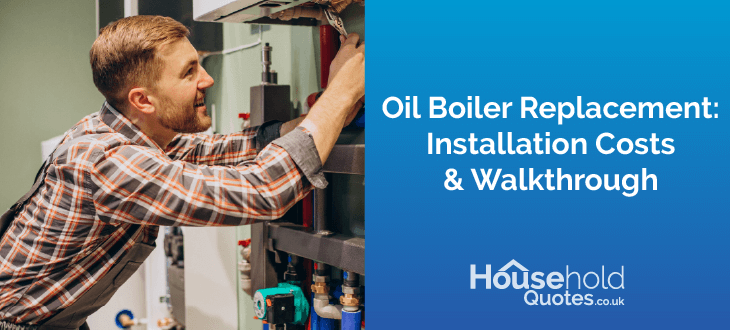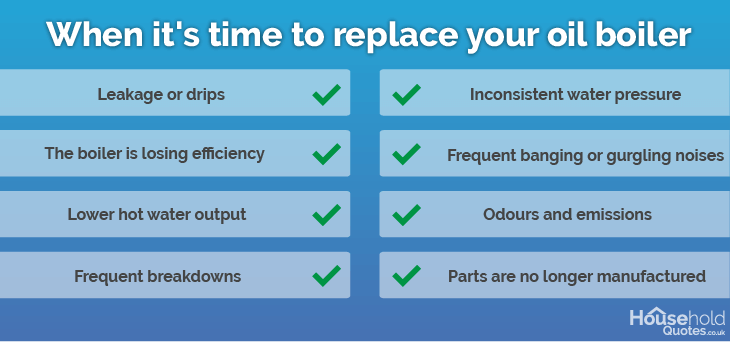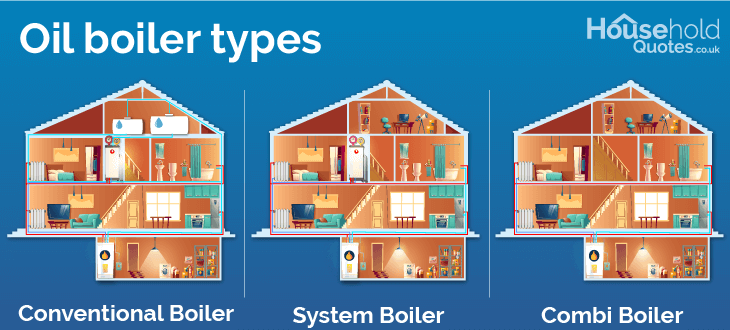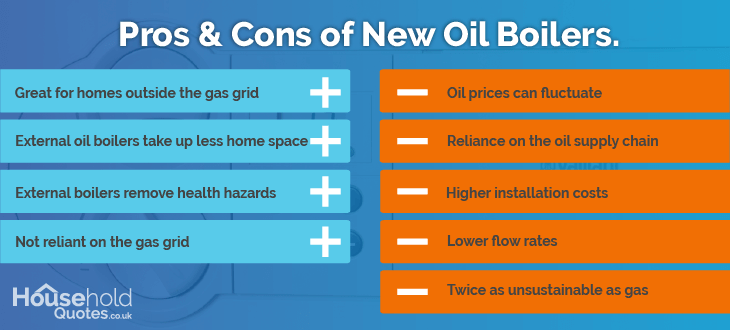Answer these simple questions and we will find you the BEST prices
Which type of solar quotes do you need?
It only takes 30 seconds
100% free with no obligation

Get up to 3 quotes by filling in only 1 quick form

Compare quotes and find yourself the best deal

Increase the value of your home by installing a new boiler
- Householdquotes.co.uk
- Boilers
- New Oil Boiler Replacement
New Oil Boiler Replacement: Installation Costs & Walkthrough


Opting for an oil boiler replacement eventually becomes necessary if your boiler is over 10 years old or malfunctioning frequently. Although replacing an oil boiler can cost between £1,200 and upwards of £5,000, you can save a lot thanks to higher efficiencies and lower maintenance costs that come with new models. Alternatively, there are many boilers with A-rated fuel types you could opt for that may be cheaper.
Let’s go over whether your boiler needs replacement, the average cost of oil boiler replacement, and what you need to factor into your purchase.
However, if you are sure you need a boiler replacement (oil or otherwise), you’ll need an installer you can trust. Finding one on your own can take days of laborious research, contacting companies, and comparing their offers. Since not everyone has the time for that, our service can be a great way to streamline the process.
We can provide you with up to 3 free, non-binding quotes from thoroughly vetted experts in our network. All you need to do is click the button below and fill out a 30-second form.
- Quotes from local installers
- Payment by finance available
- Save up to £975
It only takes 30 seconds

Why get a new oil boiler?
For an oil boiler, the cost to replace the full unit can be high but still cheaper than constant repairs on an outdated model. Older boilers can become inefficient over time, resulting in more fuel spent for the same amount of power generated. To avoid this, frequent maintenance checks are recommended, but when a boiler is nearing the end, there’s only so much you can do.
If repairs are too frequent, getting a new boiler might be a better option. Instead of paying for yearly repairs, a new boiler cost can be less of an expense. Boilers tend to last 15 years on average so it’s best to replace one if it's nearing the end of its life.
Another problem with keeping an old boiler is that its parts may go out of production, eventually making repairs impossible. If this happens, you will definitely have to switch to a newer model.
Particularly, with gas and oil boilers, there are additional risks due to their fuel types. They could be releasing hazardous fumes that could harm the health of a home’s residents. Older boilers succumb to these problems far more easily as parts begin to decay around the end of their lifespan. A boiler leaking water alone is not inherently dangerous, but if you smell fumes you should contact a professional right away.
Another reason to get a new boiler is that newer models or different boiler types can open up space in your home. Switching from a conventional boiler to a combi can take some work but, due to how few parts combis have, they can clear up a lot of space.
When should I replace my oil boiler?

Many of the instances outlined above constitute getting a new boiler. Some of the main signs are when it leaks or drips too frequently, loses efficiency, does not produce enough hot water or water pressure, and releases unusual odours.
Other signs that a boiler might need replacing or repairs include system error messages or even breakdowns. If these persist, your boiler may need more extensive work. If you hear banging or gurgling noises from the boiler, it may be worth having it examined.
As mentioned above, one of the main signs your boiler needs to be replaced is that its parts are no longer in production. This often means that the boiler model is old and may break down soon, especially if it's over 15 years old. Even if it hasn't broken down yet, the hassle of finding parts will probably be more complicated than buying a new boiler.
If you suspect that your boiler is on its way out, it’s best to contact a professional and have them examine it. Finding a reliable installer can be difficult since it often requires days of strenuous research involving contacting companies, gathering their offers, and comparing them on your own. If that sounds like too much of a hassle, our service can offer a better solution.
By filling out a 30-second form, we can provide you with up to 3 free, non-binding quotes from installers in your area. We’ve personally vetted them and, with multiple offers to compare, you can be assured that you’re getting a good range of options to choose from. Click the button below to get started.
- Quotes from local installers
- Payment by finance available
- Save up to £975
It only takes 30 seconds

Different oil boiler types

Oil boilers can be both internal and external. External systems have many benefits such as being less likely to spread hazardous fumes in the house or cause a fire but they can be costly. Internal oil boilers are within the home and are less expensive to install.
There are 3 types of oil boilers in terms of heating systems: combi, system, and conventional.
Oil combi boilers provide both central heating and hot water while taking up less space than both system and regular boilers. Combis produce hot water on demand rather than storing it and they also come with very few components which makes them space-efficient and easier to install. However, combi boilers are best suited to homes with lower water consumption. This makes them ideal for residences with one bathroom.
Oil system boilers are suitable for larger properties as they can save up water in a cistern and release it later. This allows them to handle larger volumes but may require some time if the storage is empty. System boilers can manage multiple bathrooms and take up less space than conventional boilers.
Conventional or regular boilers can store up a lot of hot water but this also means they require a loft space or attic to function properly. These are best for larger properties with higher hot water needs. They are more extensive in terms of installation so they can be more difficult to install, making replacing conventional boilers easier to replace with system and combis than vice versa.
Oil boiler prices can differ from those of gas models. Generally, combi boiler prices for oil-based technologies are higher than system boiler prices. The former begins at about £1,400 and the latter at £1,200.
What size oil boiler do I need?
For the average 3 bedroom household, you would need between 24kW to 30kW oil boiler while a 1 bedroom house can make do with 18kW and above. These numbers assume the average UK energy consumption for households matching these sizes.
| What size oil boiler do I need? | ||
|---|---|---|
| Household size | Boiler size | Boiler price |
| 1-2 bedroom house | 18kW-24kW | £1,200 - £3,600 |
| 3-4 bedroom house | 24kW-30kW | £1,700 - £4,000 |
| 5+ bedrooms | 30kW-40kW | £2,300 - £5,000+ |
Of course, boiler sizes can be difficult to estimate without examining the home they are being installed in. That’s why you need to hire a reliable installer who can walk you through what you need. However, finding one can take days of contacting companies and comparing their prices. Luckily, you don’t have to do it on your own because our service is here to help.
All you have to do is fill out a 30-second form and we’ll provide you with up to 3 free, non-binding quotes from thoroughly vetted installers in our network. That way you can be sure you’re not being overcharged for your installation. Click the button below to get started.
- Quotes from local installers
- Payment by finance available
- Save up to £975
It only takes 30 seconds

Advantages & disadvantages of oil boilers

Pros
Cons
How does a new oil fired boiler replacement & installation work?
Oil boiler installations have a lot of crucial steps:
Installers are important for this entire process and a reliable professional can keep those central heating prices down. To make sure you’re getting the best prices, you will need to consult an installer you can trust. While this could take days of research and comparing prices, we can simplify the process for you.
Our service can provide you with up to 3 free, non-binding quotes from installers that we’ve thoroughly vetted. Click the button below to get started.
Oil boiler replacement cost & installation cost
| Oil boiler installation & replacement costs | |
|---|---|
| Installation costs | £500 - £2,000 |
| Oil boiler supply costs | £1,200 - £5,000+ |
For specific manufacturers, oil boiler costs can vary:
Since oil boilers can be fairly expensive and heavy in terms of their carbon footprint, which is why many grants help alleviate the costs and help transition towards more sustainable forms of heating.
Are there oil boiler replacement grants in the UK?
Replacing your oil boiler is made easier through grants if you’re switching to a more sustainable form of heating. These include the ECO4 and the Boiler Upgrade Scheme. You can, under subsidies such as ECO4, replace your old boiler with an A-rated one potentially free of charge.
There are currently no grants that subsidise new oil boilers in the UK. Many of the grants focus on more sustainable forms of heating, so they tend to be for biomass boilers or alternative heating systems like heat pumps. Oil boilers are considered environmentally unfriendly so they are not considered for incentives.
In a similar vein, the UK may be looking to phase out oil boilers and gas boilers in the future. Newly built properties may not be able to purchase heating systems reliant on fossil fuels after 2025, although older properties can continue to install them for the foreseeable future. The plan is to phase out these less sustainable models by 2035 (although this gas boiler ban may be subject to changes).
Find oil boiler replacement installers near your UK household
Buying a new boiler can be costly at the best of times and it’s hard to know if you can trust the installer you’ve found. After all, finding a reliable professional can sometimes take days of laborious research and fielding offers on your own. Luckily, our service is a far better alternative that will save you time and effort, and mitigate the cost of replacing an oil boiler.
All you have to do is fill out a 30-second form with some basic information and we’ll provide you with free, non-binding offers from multiple professionals in your area. We’ve vetted every company on this list so you can be sure you’re getting the best installers at the best prices. Click the button below to get started.
- Quotes from local installers
- Payment by finance available
- Save up to £975
It only takes 30 seconds

FAQ
Oil boilers will still be available for purchase in 2025. While they won’t be installed in newly built homes, you can still replace your old one with an oil boiler or obtain a grant for a more sustainable heating system.
Yes. The average lifespan of a boiler is around 15 years. There are many issues that arise from keeping around an outdated boiler.
There is no need to replace your functional oil boiler before 2026. The Future Homes Standard will only apply to newly built homes. You should replace your boiler if it is exhibiting signs of failure.
Yes, as long as you live in a home built before 2026. Oil and gas boilers will still be available to pre-existing properties. However, you can also buy a more sustainable system using a grant.
If your older boiler requires too many repairs, malfunctions, or is losing its efficiency, it may be cheaper in the long run to get a new one, despite the initial costs.

Rawal is an ex-tech journalist with a passion for sustainable innovations, green policies, and their adoption. With a straightforward writing style meant to be easily digested but full of handy tips, they are geared towards readers of all levels of familiarity with the technologies and home appliances covered.
